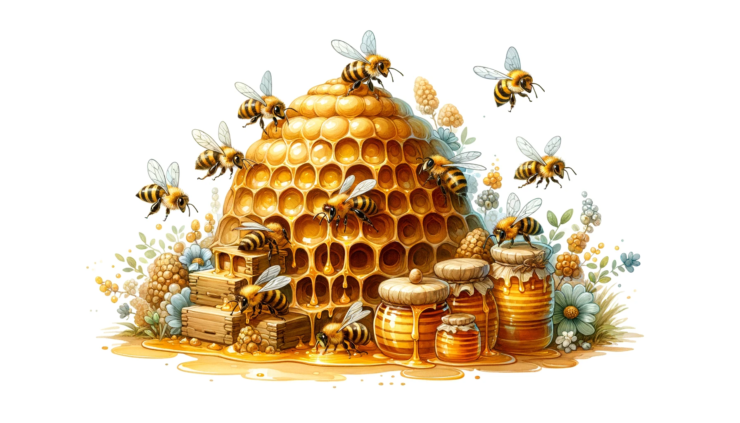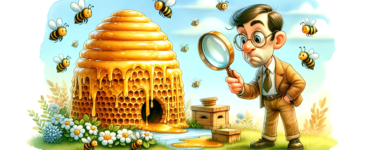Did you know that honey never spoils? Archaeologists have found pots of honey in ancient Egyptian tombs that are over 3,000 years old and are still in perfect eating condition.
Honey’s longevity is due to its unique composition, which creates an environment unfavorable for bacteria and microorganisms. Its low moisture content, high acidity, and the presence of hydrogen peroxide work together to prevent spoilage indefinitely.
Let’s uncover these astonishing aspects of honey that you likely haven’t heard before:
- Honey is not suitable for infants under one year old. Honey can have a kind of bacteria that is bad for babies. This bacteria can make babies very sick with something called infant botulism. This sickness can make a baby weak and floppy, and they might not be able to suck well, cry weakly, get constipated, and have less muscle strength.((https://kidshealth.org/en/parents/honey-botulism.html))
- Raw honey is not superior to processed honey in terms of health benefits. Even though processed honey is heated (called pasteurization) to kill germs and keep it liquid longer, this heating process doesn’t take away the good stuff in honey, like its antioxidant contents.((https://www.webmd.com/diet/honey-health-benefits))
- Honey should be consumed in moderation. Many popular beliefs about honey being super healthy don’t have much scientific proof. Honey is mostly made of sugar and has more calories than the white sugar we use in the kitchen. However, since honey is sweeter than white sugar, you might use less of it if you substitute sugar with honey in recipes or drinks.((https://www.webmd.com/diet/honey-health-benefits))
- Honey is not so nutritious. Adding honey to your diet offers no special health benefits you can’t get from other foods. Therefore, if you don’t already use honey, there’s no need to start using it, especially since honey is high in sugar, and you can get similar health benefits from other, less sugary foods.((https://www.goodrx.com/conditions/diabetes/can-diabetics-eat-honey))
- Honey doesn’t raise blood sugar levels as quickly as regular table sugar. This is because honey contains more fructose, a type of sugar with a lower GI (glycemic index) compared to glucose or sucrose (the main type of sugar in table sugar). The GI measures how fast a food raises blood sugar levels. So, because honey has more fructose and a lower GI, it increases blood sugar levels more slowly than table sugar. However, consuming any form of sugar, including honey, will increase your blood glucose levels.((https://www.goodrx.com/conditions/diabetes/can-diabetics-eat-honey))
- Honey contains antioxidants, protecting the body from inflammation. Inflammation in the body can harm cells and cause different health problems, like heart disease, cancer, and diseases where the body mistakenly attacks itself (autoimmune disorders). Honey contains substances called polyphenols and flavonoids, which work as antioxidants. These antioxidants help stop inflammation. So, eating honey can help protect your body from many diseases by preventing inflammation.((https://www.webmd.com/diet/honey-health-benefits))
- Adulterated honey is difficult to distinguish from pure honey. Some honey is mixed with other things like cane sugar, corn syrup, or different types of sweet syrups. This mixing is called adulteration. You usually can’t tell if honey is pure or has added stuff unless you do special tests in a lab.((https://www.webmd.com/diet/honey-health-benefits)) The National Honey Board, an organization related to honey, says that figuring out if honey is real or fake is a big challenge for the honey industry.((https://honey.com/about-honey/championing-pure-honey))
- Honey can come in many different flavors, colors, and textures. This variety exists because bees make honey from the nectar of different types of flowers. Each type of flower gives the honey a unique taste, color, and feel.1
- Honey is also known for its ability to fight infection due to its anti-bacterial properties. It’s commonly used as a natural cure for cuts, coughs, and sore throats.((https://www.ncbi.nlm.nih.gov/pmc/articles/PMC5424551/)),((https://fortuneonline.org/articles/chemical-composition-and-uses-of-honey-a-review.html))
- Honey is a natural source of carbohydrates, providing a quick energy boost. Honey has a special mix of natural sugars and small bits of healthy things like antioxidants, enzymes, minerals, vitamins, and amino acids. A dietitian at the National Honey Board says that because of this mix, honey is a good, natural choice for a snack in the afternoon that gives you energy.((https://honey.com/newsroom/campaign/re-charge-your-day-with-honey))
- Not all bees produce honey. Out of 20,000 species of bees, only a small fraction make honey.((https://www.usgs.gov/faqs/how-many-species-native-bees-are-united-states)) The species used for commercial beekeeping in the U.S. is Apis mellifera((https://content.ces.ncsu.edu/the-different-types-of-honey-bees)), one of only seven known honey bee species.((https://justbeehoney.co.uk/blogs/just-bee-honey-blog/how-do-bees-make-honey))
- Not all honey comes from bees. The Mexican honey wasp is also a honey producer. However, this type of honey can sometimes be poisonous.((https://beeswiki.com/mexican-honey-wasps/))
While honey is renowned for its myriad benefits, ranging from its antioxidant properties to its role as a natural energy booster, it’s crucial to recognize that it can also be harmful if not consumed correctly. Overconsumption of honey, especially given its high sugar content, can lead to health issues.






































Add comment